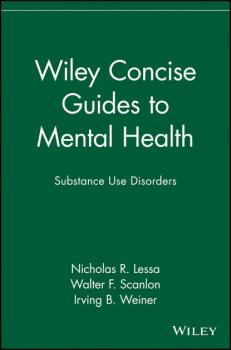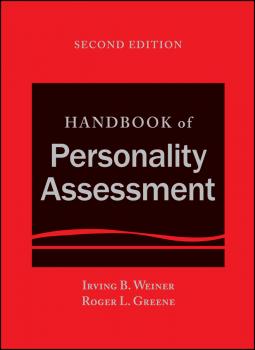Irving Weiner B.
Список книг автора Irving Weiner B.Wiley Concise Guides to Mental Health
The Wiley Concise Guides to Mental Health: Substance Use Disorders uses clear, highly accessible language to guide the reader through the entire continuum of addiction care and present the latest scientific understanding of substance use and abuse. This comprehensive, informative reference provides a complete overview of diagnosis, treatment, research, emerging trends, and other critical information about chemical addictions. Both biomedical and psychiatric conditions and complications are thoroughly covered. Like all the books in the Wiley Concise Guides to Mental Health series, Substance Use Disorders features a compact, easy-to-use format that includes: Vignettes and case illustrations A practical approach that emphasizes real-life treatment over theory Resources for specific readers such as clinicians, students, or patients In addition to the fundamentals of chemical addictions and treatment, Substance Use Disorders covers some of the most cutting-edge topics in the field, including innovative treatment approaches, outcome demands, brain science, relapse-prevention strategies, designer drugs, spirituality, and other areas. This straightforward resource is admirably suited for a wide variety of readers, from those in the helping professions, to law enforcement personnel, to recommended reading for clients currently in treatment.
Principles of Psychotherapy
Generations of clinicians have valued Principles of Psychotherapy for its breadth of coverage and accessibility and the author's ability to gather many elements into a unified presentation. The Third Edition presents the conceptual and empirical foundations of evidence-based practice perspectives of psychodynamic theory. It also offers case examples illustrating what a therapist might say and do in various circumstances. In addition, it includes discussion of broader psychodynamic perspectives on short-term therapy. Mental health professionals will benefit from the revised edition s inclusion of empirically based guidelines for conducting effective psychotherapy.
Handbook of Psychology, Health Psychology
Psychology is of interest to academics from many fields, as well as to the thousands of academic and clinical psychologists and general public who can't help but be interested in learning more about why humans think and behave as they do. This award-winning twelve-volume reference covers every aspect of the ever-fascinating discipline of psychology and represents the most current knowledge in the field. This ten-year revision now covers discoveries based in neuroscience, clinical psychology's new interest in evidence-based practice and mindfulness, and new findings in social, developmental, and forensic psychology.
Handbook of Psychology, Experimental Psychology
Psychology is of interest to academics from many fields, as well as to the thousands of academic and clinical psychologists and general public who can't help but be interested in learning more about why humans think and behave as they do. This award-winning twelve-volume reference covers every aspect of the ever-fascinating discipline of psychology and represents the most current knowledge in the field. This ten-year revision now covers discoveries based in neuroscience, clinical psychology's new interest in evidence-based practice and mindfulness, and new findings in social, developmental, and forensic psychology.
Handbook of Psychology, Educational Psychology
Psychology is of interest to academics from many fields, as well as to the thousands of academic and clinical psychologists and general public who can't help but be interested in learning more about why humans think and behave as they do. This award-winning twelve-volume reference covers every aspect of the ever-fascinating discipline of psychology and represents the most current knowledge in the field. This ten-year revision now covers discoveries based in neuroscience, clinical psychology's new interest in evidence-based practice and mindfulness, and new findings in social, developmental, and forensic psychology.
Handbook of Personality Assessment
The essential resource for personality assessment, updated and expanded The Handbook of Personality Assessment provides comprehensive guidance on the administration, scoring, and interpretation of the most widely-used instruments. Written by two of the field's foremost authorities, this well-balanced guide blends theory and application to provide a foundational reference for both graduate students and professionals. Updated to reflect the most current advances, this second edition includes new chapters on the Minnesota Personality Inventory-Restructured Form and the Rorschach Performance Assessment System, along with in-depth coverage of the MMPI-2, MMPI-2-A, MCMI-IV, PAI, NEO-PI-R, Rorschach Comprehensive System, TAT, and Figure Drawing and Sentence Completion Methods. Each instrument is discussed in terms of its history, administration, scoring, validity, assessment, interpretation, applications, and psychometric foundations, and other chapters address ethical considerations and provide general guidelines in the assessment process. Personality assessments guide recommendations in a broad range of clinical, health care, forensic, educational, and organizational settings. This book delves deeply into the nature and appropriate use of the major assessment instruments, with authoritative insight and practical guidance. Review the latest concepts, research, and practices Administer, score, and interpret the most widely-used instruments Understand the psychometric foundations of personality assessment Access downloadable sample reports that illustrate software interpretation An individual's nature and disposition can be assessed in several ways. This book focuses on standardized psychological tests that assess personality characteristics and indicate how a person is likely to think, feel, and act. The results can only be as accurate as the process, from assessment selection and administration, to scoring, interpretation, and beyond. The Handbook of Personality Assessment is an invaluable resource for every stage of the process, with a practical focus and advice from two leading experts.
Handbook of Psychology, Personality and Social Psychology
Psychology is of interest to academics from many fields, as well as to the thousands of academic and clinical psychologists and general public who can't help but be interested in learning more about why humans think and behave as they do. This award-winning twelve-volume reference covers every aspect of the ever-fascinating discipline of psychology and represents the most current knowledge in the field. This ten-year revision now covers discoveries based in neuroscience, clinical psychology's new interest in evidence-based practice and mindfulness, and new findings in social, developmental, and forensic psychology.
Handbook of Psychology, History of Psychology
Psychology is of interest to academics from many fields, as well as to the thousands of academic and clinical psychologists and general public who can't help but be interested in learning more about why humans think and behave as they do. This award-winning twelve-volume reference covers every aspect of the ever-fascinating discipline of psychology and represents the most current knowledge in the field. This ten-year revision now covers discoveries based in neuroscience, clinical psychology's new interest in evidence-based practice and mindfulness, and new findings in social, developmental, and forensic psychology.
Handbook of Psychology, Assessment Psychology
Psychology is of interest to academics from many fields, as well as to the thousands of academic and clinical psychologists and general public who can't help but be interested in learning more about why humans think and behave as they do. This award-winning twelve-volume reference covers every aspect of the ever-fascinating discipline of psychology and represents the most current knowledge in the field. This ten-year revision now covers discoveries based in neuroscience, clinical psychology's new interest in evidence-based practice and mindfulness, and new findings in social, developmental, and forensic psychology.
Handbook of Psychology, Research Methods in Psychology
Psychology is of interest to academics from many fields, as well as to the thousands of academic and clinical psychologists and general public who can't help but be interested in learning more about why humans think and behave as they do. This award-winning twelve-volume reference covers every aspect of the ever-fascinating discipline of psychology and represents the most current knowledge in the field. This ten-year revision now covers discoveries based in neuroscience, clinical psychology's new interest in evidence-based practice and mindfulness, and new findings in social, developmental, and forensic psychology.









